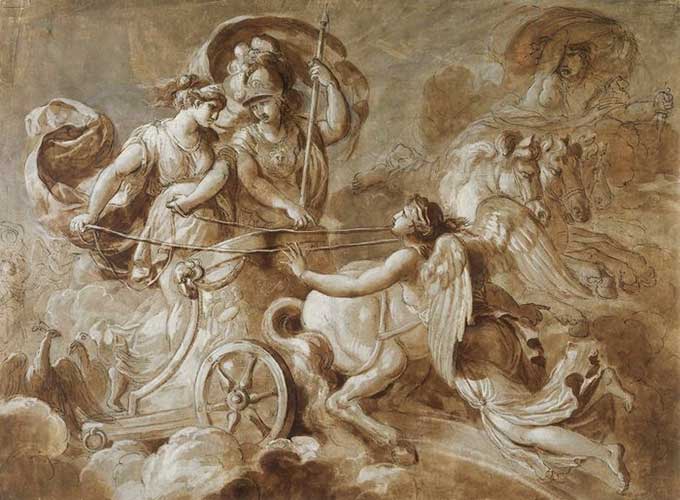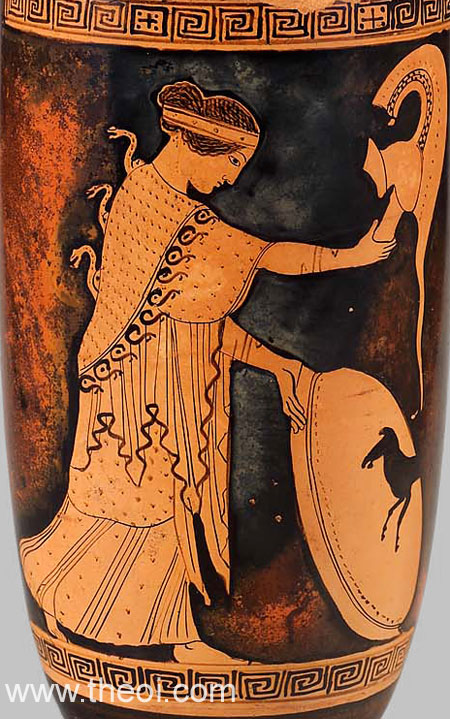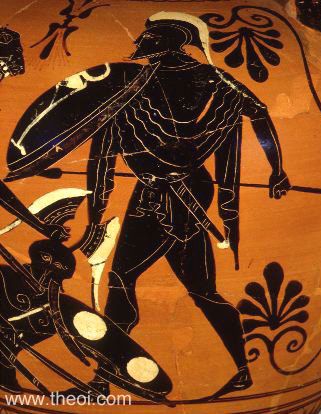One of the most famous stories that have ever been narrated (the most well-known of which being in Homers Illiad) the Trojan War is by far the greatest war in classical mythology.The Trojan War, which occurred during the Bronze Age, was a conflict between two kingdoms, Mycenaean Greece and Troy. The battle has also caught the imagination for millennia.

The events of the Trojan War can be found in a variety of Greek literature and depicted in several Greek pieces of art. However, there is not one single authoritative text that recounts all of the events that happened during the war. Instead, a story can be assembled from several sources, some of which recount contradictory versions of events.
In this article, we’re going to discuss the cause of the Trojan War so that you have a better understanding of why the war happened.
Thetis and Peleus
The cause of the Trojan War goes back to a prophecy that deals with the Olympian order and a divine love contest. Years before the beginning of the Trojan War, both Poseidon and Zeus fell in love with a beautiful sea-nymph, Thetis.
Both of them wanted to make Thetis his bride, but they both backed off after they were informed about the consequences of the actions they were considering. It was said that it was fated that Thetis the sea-goddess would bear a princely son, a son that would be stronger than his father, and would have a weapon in his hand that would be more powerful than the trident or thunderbolt if she were to lay with Zeus or one of his brothers.
Zeus didn’t want to risk anything, so he decided that Thetis would marry King Peleus, “the most pious man living on the plain of Iolcus.”
Zeus’ Plan
From Greek mythology, it can be said that Zeus became king of the gods by overthrowing his father, Cronus. Zeus wasn’t faithful to his wife and sister, Hera. He had so many relationships that he fathered many children.
Zeus believed that the earth was overpopulated by people, so he thought that the Trojan War could be used to depopulate the Earth, especially of his demigod children. Zeus would later come to learn from either Prometheus or Themis that he would someday be overthrown, much like his father.
Remember earlier; we talked about a prophecy that stated that the son of a sea-goddess would become more powerful than its father – this is where it comes into play. Probably for both of these reasons, Thetis was made to marry an elderly human king, Peleus, by Zeus’ orders.
The Judgement of Paris
Now that Thetis’ husband was figured out, Zeus decided to throw a huge feast in celebration of Thetis’ and Peleus’ marriage; this is the beginning of the Trojan War.
The war originated as a quarrel between three goddesses (Aphrodite, Athena, and Hera) over a golden apple, sometimes referred to as the Apple of Discord. It all happened at the wedding of Peleus and Thetis, when Eris, goddess of strife and discord, was not invited. She was turned away and in retaliation, threw a golden apple amongst the goddesses there “to the fairest.”
When Aphrodite, Hera, and Athena claimed it, Zeus mediated and assigned Hermes to bring the goddesses to Paris of Troy to settle the debate. They all offered gifts – Athena, goddess of war, offered him victory in battle; Hera, the goddess of home, promised him to be king of all men; and Aphrodite, the goddess of love, offered him Helene (the most beautiful woman in the world) in marriage.
Paris chose Aphrodite. However, Helene was the wife of Menelaus, the king of Sparta. Paris, under the disguise of a diplomatic mission, went to Sparta to abduct Helene so he could bring her back to Troy. However, before Helene could look up to see Paris, she was shot with an arrow by Eros, or Cupid, and fell in love with Paris as soon as she saw him.
The Trojan War
From classical sources, it can be said that the Trojan War started after the elopement (or abduction) of the queen of Sparta, Helen by Paris, the Trojan prince. The jilted husband of Helen, Menelaus, persuaded his brother, Agamemnon, to lead a voyage to find her. Other Greek heroes, such as Ajax, Nestor, Odysseus, and Achilles, joined Agamemnon, along with a fleet of over a thousand ships from all over the Hellenic world. This group crossed the Aegean Sea to Asia Minor to lay siege to Troy and demand Helen’s return by the Trojan king, Priam.
The siege, which was punctuated by skirmishes and battles including the deathsof Hector and Achilles, lasted for more than ten years. It ended when the Greek armies withdrew from the camp, leaving behind a large wooden horse outside the gates of Troy. There was plenty of debate, and unheeded warnings by Cassandra, Priam’s daughter, the Trojans pulled the wooden horse into their city.
The wooden horse was devised by Odysseus, who was trying to find a way to end the war for good. He asked that the wooden horse be designed with a hollow belly so that soldiers could hide inside the horse, which would be wheeled in front of Troy’s city gate.
Meanwhile, the Greek fleet sailed away to the nearby island Tenedos, leaving behind a single, double agent named Sinon. He convinced the Trojans that the Greeks had withdrawn from the war and that the Trojan Horse was a gift that would bring them a fortune.
When nighttime came, the horse was opened up by the soldiers inside, and the Greek warriors climbed out of the horse and destroyed Troy from within the city walls.
The Aftermath
Gods never forget and hardly forgive. The surviving Greek heroes learned this the hard way because although they were victorious, most of them were severely punished for their transgressions. In fact, only a few of them would make it back to their homes – and they would only do so after several exploits and adventures. Even fewer would receive a warm welcome home because they were either exiled into oblivion or being killed by their loved one – in some cases, both.


